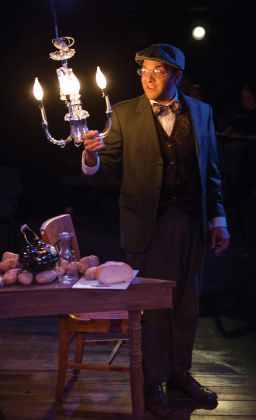
One of the reasons that actors love Harold Pinter is the almost limitless opportunities for individual interpretation offered by his enigmatic texts. The atmosphere of impending disaster arising from intense emotional agitation devoid of expository signposts occurring within everyday environments is what made Pinter's reputation in 1957, when this brief—running barely over an hour—one-act exercise in shivery menace premiered in an England still recovering from wartime devastation. Rose and Bert Hudd live in a one-room apartment—not unusual during the housing shortage that would linger for decades. On this wintry morning, homebody Rose speculates on the identity of neighboring tenants and frets over being left alone by her husband's going out for a drive. Her solitary day is interrupted by building manager Mr. Kidd checking the utilities in the run-down property, a cheerful couple (introducing themselves as Mr. and Mrs. Sands) house-hunting under the impression that the Hudds's unit is vacant, and a stranger named Riley, who entreats Rose to "come home." When Bert returns to discover Riley in his home, he proceeds to savagely beat the visitor, who is—just coincidentally—blind, scarred, mixed-race, cross-dressed and probably homeless. In 1957, Pinter's script described Riley as a "blind negro," leading audiences to wonder if Rose and/or Bert were "passing" for white, a subtext later giving way to Riley as a harbinger of ethnic diversity in a hitherto racially segregated neighborhood. These possibilities might have been sufficiently unnerving for their time, but what scares us nowadays? Disease, maybe—incurable, uncontainable, physically disfiguring, mentally debilitating contagions transforming their victims into social pariahs. Viewed thusly, Pinter's cryptic scenario becomes a modern version of Poe's “Masque of the Red Death,” the intrusive spouses who calmly scatter feathers and steal food representing scavenger ravens, and Riley's arrival signal the end of the Hudds's self-imposed quarantine, presenting them with a glimpse of their future. That's one interpretation, anyway. (Did I mention that the exit music in Heath Hays' sound design is the saccharine mid-20th-century ballad, "Que Sera, Sera?") You might have another. The always-formidable Kirsten Fitzgerald exhibits unswerving serenity under pressure, surrounded by Anish Jethmalini's rabbity janitor, Dano Duran and Mierka Girten's audacious ghouls, HB Ward's truculent Bert and JoJo Brown's visually shocking Riley, but Red Orchid director Dado (sic) has instructed her cast to give nothing away. Look for this play to generate an abundance of coffee-fueled post-show debates extending over weeks—just like Pinter planned it.
